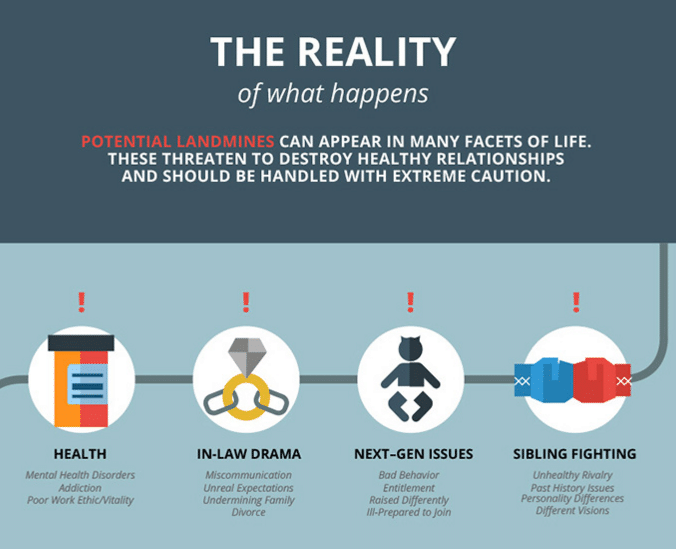
There are several types of family business employees who create animosity or difficulty within the workplace. There are a few types that are found in every company, from those who wish to always be in control to those that are just downright unpleasant.
Within a family business, however, the relationships between employees is even more complex. Negative employee relations are often brought on by disputes or dislikes within the family itself, often having nothing to do with the company or the company’s culture. These issues need to be addressed in ways similar to how non-family employee relations are dealt with – by creating a culture of tact, respect and no-nonsense.
Family business leaders seeking to alleviate problems between employees need to have a very fair, very open-minded approach. There is often “bad blood” between family members that has either created many of the issues or made them worse, and leaders need to be careful to set aside their own opinions about certain family employees, as well. Pre-judgement creates an unfair, biased approach to remediation, and it does not produce results.
Get It Out in the Open
The first way to deal with a difficult family business employee is to communicate openly.
Oftentimes, when an employee has been difficult to be around or has been causing animosity with others, those who are around the employee tend to leave him or her alone – leaders included. That person is generally irritating, or the situation seems like it’s not going to get any better.
The truth is that quite often, the employee is discontent in one way or another and this needs to be shared and put out into the open with leaders. Good managers need to be attentive to when an employee seems discontent – you never know what may be going on. There may a real problem that can be solved, or it may be that the employee just wants to be listened to. Listening can open many doors for solutions.
Give Concise Feedback
When listening to an employee discuss what is causing him or her to be difficult, make sure your feedback isn’t clouded with judgment or dislike – this is especially important in a family setting, as family history can create a lot of pre-judgement for family business managers.
This type of feedback comes across ambiguous and doesn’t produce results, however. It usually only makes the problem worse. Concise feedback does not mean sugar-coating anything, either – it means that you may have to be tough. Generally, prudent and thoughtful listening can help to lower the person’s defenses, allowing he or she to be open to your feedback.
Deal With the Behavior, not the Person
It is important for family business leaders to view the employee difficulty as a problem that is solvable.
It’s a behavior and behaviors can be changed. If an issue is approached in such a way that the person feels attacked, especially if there has been other negative family history regarding that person, he or she will most likely shut down and not be willing to deal with anything at all.
The person’s behavior should be called into question, not their personality or belief system. This can be difficult, however, when the issue is caused by a team member’s personal issues, such as anger, fear or judgement.
However, it is still always best to approach the behavior and the results of the behavior so the person is more open to listening. A culture of acceptance is important, but so is a culture of no-nonsense and a firm stance that all employees need to support each other.
Manage Your Thoughts During the Confrontation
When a family business leader approaches a situation with pre-judgements and continues to have these thoughts during the actual confrontation, he or she is not actually listening. Solid family managers take a fair witness approach and try to move the conversation to a specific goal, such as “This person’s behavior is slowing down the team. I need to support a change for the better.”
Create Consequences
Acceptance and listening are two beneficial ways to approach a difficult employee.
Many employees simply need to know that if they do not change their behavior, there will be consequences. Wise family business managers have to be specific, not ambiguous, about these consequences. If the behavior doesn’t change, the person will not be eligible for a promotion. If the person does not change his or her mindset, he or she will be let go. These types of negative consequences can motivate many people to change.
Difficult employees within the family business call for a sensitive, tactical approach. There could be a lot at stake, especially as it applies to family relations. A lot of people could be hurt or upset if an employee is not dealt with in a fair and understanding manner, so being tactful, fair and firm is always the best approach to have.
LANDMINE DETECTION MAP
Are you battling next-generation issues, in-law drama, sibling rivalries or even health-related problems due to stress in your family business? The Landmine Detection Kit will help you identify underlying issues that eventually could create catastrophic damage to your family business.





